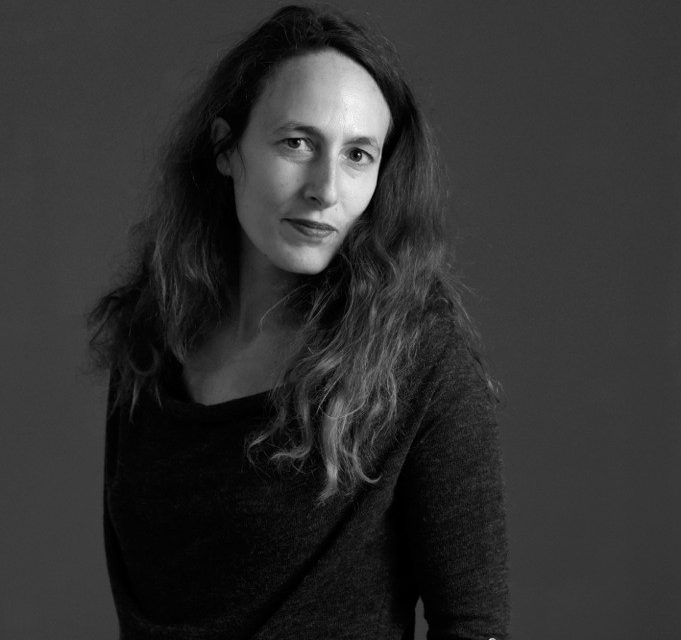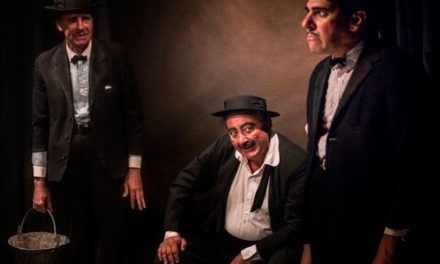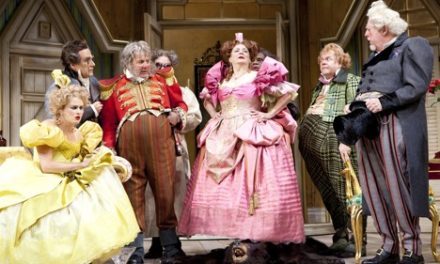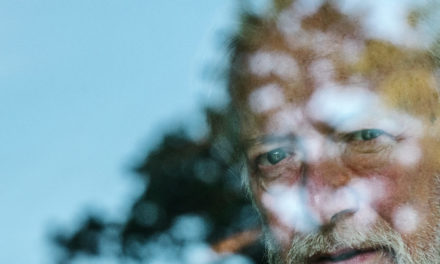The 7th Edition of Seuls en scène, Princeton French Theater Festival presents Harlem Quartet directed by Élise Vigier from Théâtre des Lucioles on September 21 and 23.
Harlem Quartet, a story on human destiny, is based on James Baldwin’s novel Just Above My Head adapted for the stage by Élise Vigier in collaboration with the dramaturg-translator Kevin Keiss, with original music by American poet/rapper/musician Saul Williams. This critically acclaimed show from the 2017-18 French theatrical season is exceptional in its all-black cast, exceedingly unusual for a production in France.
Élise Vigier spent some time with us before leaving for Princeton.
(Interview conducted by Nicole Birmann Bloom in August, 2018)
Nicole: Could you tell us about your motivations for adapting the text Just Above My Head for the stage? Your fears, hesitations, difficulties, and surprises? About your collaboration with Kevin Keiss, dramaturg and translator, and the actors?
Élise: I read Harlem Quartet – this is how Just Above My Head has been translated into French – for the first time when I was between 20 and 25 years old and I adored it. It is one of those rare books where there is a genuine connection between the reader and the book.
In reading Harlem Quartet, I was deeply moved by the book and completely taken with Baldwin’s writing and by this specific story. The book was given to me by Nanténé Traoré (an actress in Harlem Quartet; she is also the assistant director). I myself have now given it as a gift to all my friends, to my close friends. It is a story of friendship, family, and groups.
I read other books by Baldwin, and I saw the documentary about him The Price Of The Ticket. I discovered a man full of elegance with ideas and thoughts of rare and amazing precision. Especially the way he would turn a question around to the asker. And his humor, in my opinion, is exemplary.
Then, I worked on many other things and when four or five years ago I asked myself what I wanted to direct, what stories I wanted to tell, what my questions were, Harlem Quartet popped up!
Because of the scale of the novel, I needed someone to adapt and retranslate the novel for the stage with me. I thought right away of Kevin Keiss. We worked together on the project Hecuba and his way of handling the subject of memory for those who remain was profound.
I knew Kevin spoke perfect English, bilingual, and that we could catch the rhythm of the language from the original text for the stage, I mean so that the text could be said, spoken by actors.
I also thought right away of images for the set: images of Harlem. I could not be working on the project without starting from the source, and it is Harlem. The composition of the book engenders this: the streets, the trees, the buildings of Harlem are at the source, the background, the “skin” of the characters. So I asked the Institut français for a fellowship to go and film in Harlem. We went and explored the places where the novel took place and we met people from Harlem along the way.
I wanted to position myself as a foreigner so that the staging was like a journey, an exploration. I wanted to highlight the corresponding as well as the dissonant parts of American and French history. I had just written a script with filmmaker Nicolas Mesdom about my own childhood – well the place of childhood in my memory, and I thought of him for the filming part of the production.
At the time, it happened that in France, discussions about identity reappeared: a sense of belonging, labels, categories. And for sure, this context certainly contributed to my motivation to go farther and develop Harlem Quartet.
In the novel Just Above My head, it is all there: homosexuality, heterosexuality, family, friendship, the horror, whites and blacks, love. It is all there, together, not separated, bringing the reader or the spectator face-to-face with his/her own humanity.
This makes me think of a sentence by Baldwin that I find so prescient that I would like to quote it:
“Perhaps the whole root of our trouble, the human trouble, is that we will sacrifice all the beauty of our lives, will imprison ourselves in totems, taboos, crosses, blood sacrifices, steeples, mosques, races, armies, flags, nations, in order to deny the fact of death, which is the only fact we have.” (James Baldwin, The Fire Next Time, Vintage, p. 91)
Being that Baldwin is one of the best-known African-American authors of our time and Harlem has traditionally been a hub of black culture, I also wanted to work with an African-American musician who has this musical history within, a musician who had already done something different with it, I mean questioned and transformed and went farther.
I was extremely lucky to meet Saul Williams who accepted to play the character of Paul in the film, that is, the father of Arthur and Hall in the novel; he also composed five pieces for the performances (Above My Head, Take Me To The Water, Nicodemus …). Manu Leonard and Marc Sens composed the rest of the pieces.
From the beginning, what interested me was the question of “From now on”–meaning examining this story from our current perspectives rather than reconstituting it. This is the idea and the title that sustains a series of novels by Leslie Kaplan, another author I have explored …
I wanted to show how history leaves traces in the bodies in the most intimate stories.
It took three years to adapt the project: with the first trip to Harlem, then the audition, the selection of actors … We were lucky to have great partners such as La Chartreuse, Villeneuve-lès-Avignon where we worked for a week with the actors and the musicians on three elements: music, films, and acting.
The set consists of a space designed for the projection of the films; it was developed with Yves Bernard at the Comédie de Caen – Centre Dramatique National (CDN), France. The CDN is co-producing the show and I am one of the artistic directors there. We also rehearsed and developed the show at the MAC Creteil. This to say that we had a lot of time for the adaptation with periods of intensity and rest.
For the festival Seuls En Scène at Princeton University, we will present a short version of the play, 1h30 minutes instead of 2h30. It will be without the entire decor, but the films will be shown.
Nicole: I remember well your visit to New York in fall 2015 going to Harlem to dig into its history and meet with people. Could you tell us more about the research time, in Harlem, and after?
Élise: So we went to Harlem (Nanténé Traoré, Kevin Keiss, Nicolas Mesdom, and myself) with the excerpts of the text I selected. There were too many–400 hundred pages–plus a camera and ideas of adaptation. It was clear right from the beginning that I wanted to stay close to the structure of the novel, to keep the five chapters that make up the novel, each written from the point of view of one of the characters.
We had with us a map of the locations where the novel happens. Once there, we felt like we were connecting the novel’s pieces. We were living in Harlem and filmed night and day. We interviewed people in the streets in a way, I’m sure, was surprising for the Americans, because we were not speaking English well, except Kevin Keiss who was translating.
We met with many older men, rappers who were shooting a music video, boxers, a woman from the Maysles Center, and another woman from the Schomburg Center. We went to the Apollo Theater and to churches. We met Mrs. Sy of the Cultural Center for Mali–who takes care of young Malian children, teaches them French as well as the stories of their country. Guys from Paris, more exactly from Menilmontant-Belleville, who came to Harlem to open a pizzeria… and that is just to name a few. And of course, Saul Williams….
We saw spaces, walls, streets, bodies who had witnessed the African-American history and we filmed. And we saw–more exactly perceived–the difference of life between the center of Manhattan and Harlem. There is no ghetto anymore and the gentrification of Harlem is widespread, but details in the bodies of young people with walkers–reminded us of the poor healthcare system, men consumed by drugs on some corners, people’s comments about the public school system, the strong presence of religion and also religious crooks, and more obesity than in other places…many details, very present that you could catch even in a 10-day period, and an enormous, palpable energy. Here is video link of our diary during that stay in November 2015: Harlem Impression from Le Studio MAC Créteil on Vimeo.
We went back to the United States in 2016, to Princeton University to work with students (inspired by Jonas Mekkas’ filmed letters) from Creteil and Princeton. The workshops were based on Baldwin, youth, their countries, love, and race. We went back to Harlem but this time to film fictional sections with Saul, Anisia Useyman and Nanténé. The generation of the parents (characters of the novel) only appears in the film sections.
Nicole: How relevant has this production appeared to you these past few years? In France? and its place among your past and future work?
Élise: I was very lucky to meet and work with great actors; I will name them all: Makita Samba, Jean-Christophe Folly, Ludmilla Dabo, Nanténé Traoré, William Edimo, Nicolas Giret-Famin. We all felt concerned by the pertinence of the play today and deeply motivated to share it. When one sees Harlem Quartet, one listens to stories and history that is not ours, it is not ours at all, but there are concordances, some things unsaid, similarities, not identical but close to; we can relate to what is happening in France and compare it to our intimate reactions. We think of the consequences of colonization, of the persecution against Jews during the WWII.
Baldwin connects politics with what is the most intimate within us: love, body, sex, and death. He turns the questions on their heads so that we cannot hide ourselves behind pre-conceived ideas. The poetic force of his writings interlaces with crude language that involves sex and bodies.
It includes the history of slavery, segregation, the annihilation of the body or the absence of thereof that left indelible marks on the following generations.
When I read the novel, I was troubled by how Baldwin deals with disappearance: the fact that one can disappear from a street corner and nobody cares; it is like the person is nothing. In his writings, the verb “to disappear” slips into the life of the characters, into their bodies, fills up their breathing, takes over their beings, sometimes …
Developing Harlem Quartet has been a very important part of my artistic development.
And I will continue with James Baldwin in staging a smaller format production, Nothing Personal by Baldwin and Richard Avedon. It will be with Marcial Di Fonzo Bo as Richard Avedon and Jean-Christophe Folly (who plays Hall Montana in Harlem Quartet) as James Baldwin set for March 2019 at Comedie de Caen.
This article originally appeared in frenchculture.org and has been reposted with permission.
This post was written by the author in their personal capacity.The opinions expressed in this article are the author’s own and do not reflect the view of The Theatre Times, their staff or collaborators.
This post was written by Nicole Birmann Bloom.
The views expressed here belong to the author and do not necessarily reflect our views and opinions.


















